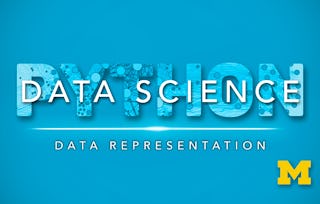This course will introduce the learner to network analysis through tutorials using the NetworkX library. The course begins with an understanding of what network analysis is and motivations for why we might model phenomena as networks. The second week introduces the concept of connectivity and network robustness. The third week will explore ways of measuring the importance or centrality of a node in a network. The final week will explore the evolution of networks over time and cover models of network generation and the link prediction problem.

Applied Social Network Analysis in Python

Applied Social Network Analysis in Python
This course is part of Applied Data Science with Python Specialization

Instructor: Daniel Romero
113,564 already enrolled
Included with
2,719 reviews
What you'll learn
Represent and manipulate networked data using the NetworkX library
Analyze the connectivity of a network
Measure the importance or centrality of a node in a network
Predict the evolution of networks over time
Skills you'll gain
Details to know

Add to your LinkedIn profile
4 assignments
See how employees at top companies are mastering in-demand skills

Build your subject-matter expertise
- Learn new concepts from industry experts
- Gain a foundational understanding of a subject or tool
- Develop job-relevant skills with hands-on projects
- Earn a shareable career certificate

There are 4 modules in this course
Module One introduces you to different types of networks in the real world and why we study them. You'll learn about the basic elements of networks, as well as different types of networks. You'll also learn how to represent and manipulate networked data using the NetworkX library. The assignment will give you an opportunity to use NetworkX to analyze a networked dataset of employees in a small company.
What's included
5 videos3 readings1 assignment1 programming assignment2 ungraded labs
In Module Two you'll learn how to analyze the connectivity of a network based on measures of distance, reachability, and redundancy of paths between nodes. In the assignment, you will practice using NetworkX to compute measures of connectivity of a network of email communication among the employees of a mid-size manufacturing company.
What's included
5 videos1 assignment1 programming assignment1 ungraded lab
In Module Three, you'll explore ways of measuring the importance or centrality of a node in a network, using measures such as Degree, Closeness, and Betweenness centrality, Page Rank, and Hubs and Authorities. You'll learn about the assumptions each measure makes, the algorithms we can use to compute them, and the different functions available on NetworkX to measure centrality. In the assignment, you'll practice choosing the most appropriate centrality measure on a real-world setting.
What's included
6 videos1 assignment1 programming assignment1 discussion prompt
In Module Four, you'll explore the evolution of networks over time, including the different models that generate networks with realistic features, such as the Preferential Attachment Model and Small World Networks. You will also explore the link prediction problem, where you will learn useful features that can predict whether a pair of disconnected nodes will be connected in the future. In the assignment, you will be challenged to identify which model generated a given network. Additionally, you will have the opportunity to combine different concepts of the course by predicting the salary, position, and future connections of the employees of a company using their logs of email exchanges.
What's included
3 videos5 readings1 assignment1 programming assignment1 ungraded lab
Earn a career certificate
Add this credential to your LinkedIn profile, resume, or CV. Share it on social media and in your performance review.
Instructor

Offered by
Explore more from Data Analysis
 Status: Free Trial
Status: Free TrialUniversity of Michigan
 Status: Free Trial
Status: Free TrialJohns Hopkins University
 Status: Free Trial
Status: Free TrialUniversity of California, Davis
 Status: Free Trial
Status: Free TrialUniversity of Michigan
Why people choose Coursera for their career

Felipe M.

Jennifer J.

Larry W.

Chaitanya A.
Learner reviews
- 5 stars
73.92%
- 4 stars
19.93%
- 3 stars
4.11%
- 2 stars
1.02%
- 1 star
0.99%
Showing 3 of 2719
Reviewed on Jul 15, 2018
Lectures are very well-designed. Especially, the assignment of week 4 is too good, that give me an overview of how we can apply machine learning in network analysis.
Reviewed on Sep 17, 2017
Excellent tour through the basic terminology and key metrics of Graphs, with a lot of help from the networkX library that simplifies many, otherwise tough, tasks, calculations and processes.
Reviewed on Nov 17, 2020
I have never imagined such detailed analysis can be done on a network, nx in python is really powerful package with so many powerful functions that can do ample of analysis at a whim.

Open new doors with Coursera Plus
Unlimited access to 10,000+ world-class courses, hands-on projects, and job-ready certificate programs - all included in your subscription
Advance your career with an online degree
Earn a degree from world-class universities - 100% online
Join over 3,400 global companies that choose Coursera for Business
Upskill your employees to excel in the digital economy
Frequently asked questions
To access the course materials, assignments and to earn a Certificate, you will need to purchase the Certificate experience when you enroll in a course. You can try a Free Trial instead, or apply for Financial Aid. The course may offer 'Full Course, No Certificate' instead. This option lets you see all course materials, submit required assessments, and get a final grade. This also means that you will not be able to purchase a Certificate experience.
When you enroll in the course, you get access to all of the courses in the Specialization, and you earn a certificate when you complete the work. Your electronic Certificate will be added to your Accomplishments page - from there, you can print your Certificate or add it to your LinkedIn profile.
Yes. In select learning programs, you can apply for financial aid or a scholarship if you can’t afford the enrollment fee. If fin aid or scholarship is available for your learning program selection, you’ll find a link to apply on the description page.
More questions
Financial aid available,

